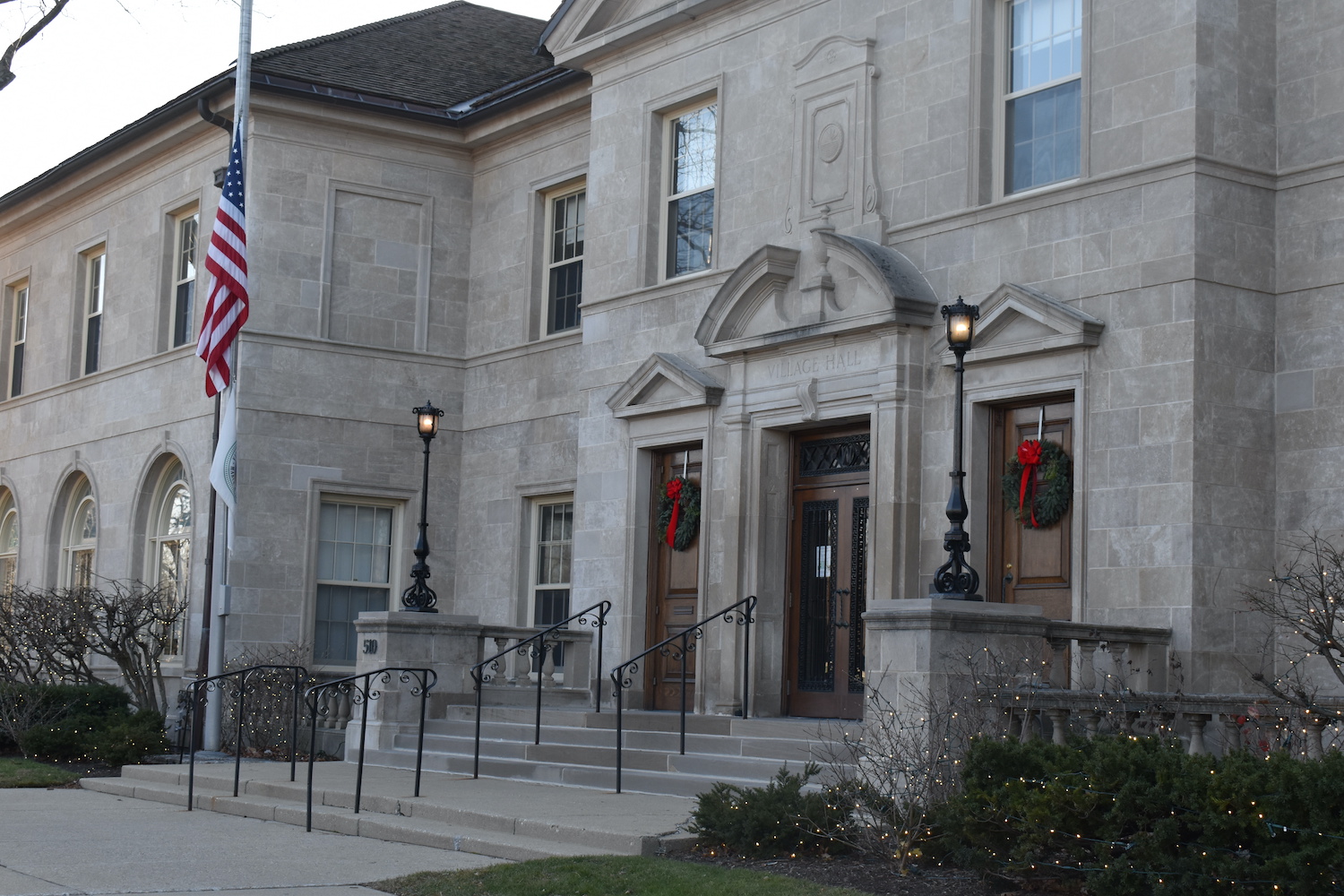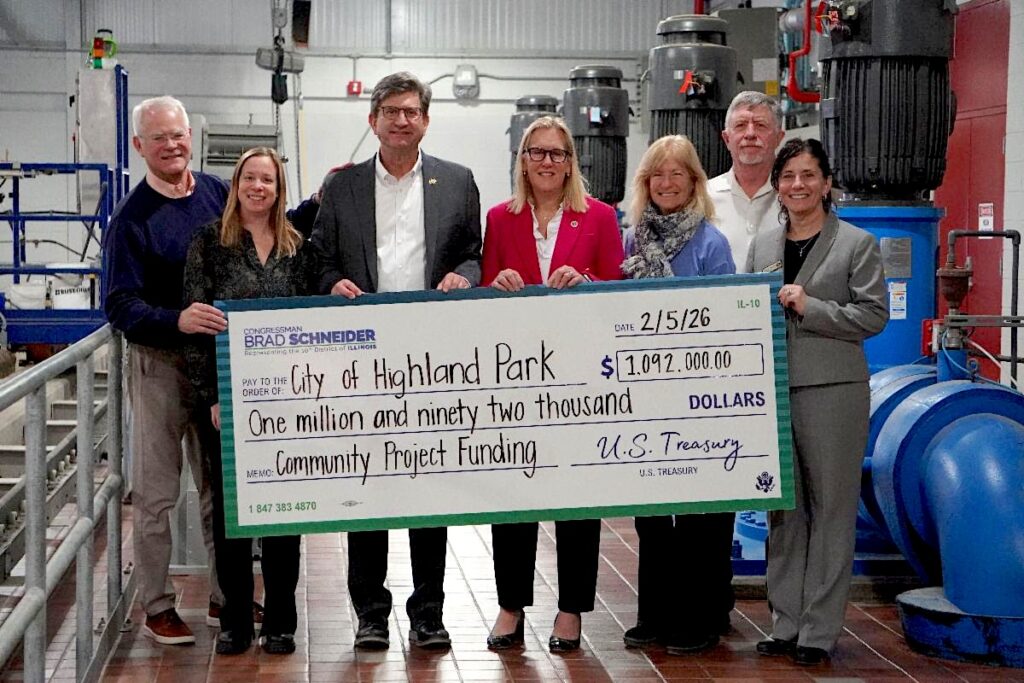
Winnetka making progress on lead line replacement; residents continue to nab rebate
Like many suburban communities, the Village of Winnetka is forging ahead to replace lead service lines in compliance with a state law requiring all of them to be removed by 2037.
The Village Council received an update on long-term project during a joint regular meeting and study session on Tuesday, Aug. 5.
Nick Narhi, the village’s director of water and electric, said a 2022 law requires all municipalities in Illinois to replace lead service lines, and since the law was passed, the village is ahead of schedule in doing so.
According to village data from 2022, 1,268 lines in the village were full lead, 235 partial lead and 31 that were not identified.
Since that study, the village has identified the unknown lines, has reduced the full lead lines to 955, and the partial ones to 264.
Narhi said the village replaces lines through a variety of methods. Replacing the line from the water main to the property line is paid for by the village. For the private side replacement, the village offers a 50% cost reimbursement up to $5,000.
Residents also have the option to sign a waiver from the Illinois Department of Public Health and keep the lines; although Narhi said the village encourages all residents to get their lead lines replaced.
The rebate program began in 2023, with the village budgeting for 20 slots. Reportedly, all 20 of those slots were filled within 36 hours, and the village spent $157,000 for the rebate program in 2023.
“We didn’t anticipate the strong demand for this program,” Narhi said.
Last year, the village budgeted for 80 slots, but only 41 residents took advantage of the program. This year, however, 50 slots were budgeted and staff expect about 45 to be taken.
Narhi said the village also has a waitlist that has 140 people on it.
“We keep that list in sequential order, and as people come on or decide to go off, we just work our way down in sequential order,” he said. “We feel like demand for the program remains high going into future budget years.”
To help fund the program, Narhi said the village has been raising water rates by 1.5% every year. Due to an increased workload, the village has also had to hire more water department staff.
The village is expected to spend approximately $490,000 this year on the lead replacement program, with that budget rising to $685,000 annually in 2027 and 2028.
After then, however, Narhi said staff anticipate a gradual decrease in costs as fewer lead service lines exist in the village.
While the state isn’t requiring municipalities to finish the work until 2037, Narhi said Winnetka’s goal is to have everything completed by 2035. He anticipates between 90-100 lines being replaced every year.
“We feel like we’re making good progress,” he said.
Despite its success, Narhi said there’s a chance the village may need to revisit the voluntary replacement program sometime in the next five to 10 years. By then, he said there may be fewer participants in the program, and potentially fewer funding opportunities available.
While the state law does not provide funds to municipalities, grant opportunities are available through entities such as the Illinois Environmental Protection Agency.
Following Narhi’s presentation, trustees spent time discussing the waitlist and reimbursements and to whom it may apply.
Village President Bob Dearborn suggested that, if someone is on the waitlist but decides they want to do the work now, they should still receive the reimbursement when their name comes up on the list.
“My thought on that was, if someone’s on the waitlist and they do work, why should they not be eligible for the subsidy, if it’s still around, when their name would come up on the list?” he asked. “I really think, from a fairness standpoint, we should consider that.”
Trustee Tina Dalman expressed concern that some residents may attempt to get the subsidy for a home remodel project, but Narhi said that’s not allowed and that any service line replacements that are triggered by renovations are not eligible for the reimbursement.
Dalman was also curious to learn how many new residents replace the lead lines when the previous homeowner decided against it, suggesting that the village look into incentives for new residents.
“I would be interested to know how many real estate transactions occur where somebody is notified and then they decide to go on the waitlist and wait several years,” she said.
Trustee Kim Handler questioned what would happen if the village discontinued the reimbursement in the future while people are still on the waiting list. She believes those residents would get upset when they didn’t get reimbursed while their neighbors did.
“I’m concerned it would cause a lot of issues,” she said, while also adding that there are two issues to look at: staff time and the village budget.
Other trustees raised issues with staff time dedicated to the work.
Narhi said he believes staff can accommodate the 140 people on the waitlist.
Dearborn asked Narhi to think about any potential future solutions that would balance both staff time and the budget.
“If there’s a way to do it that makes sense from a staffing standpoint, from a fairness standpoint, from a budget standpoint, then maybe come back to us with an idea at budget time,” he said.
The Record is a nonprofit, nonpartisan community newsroom that relies on reader support to fuel its independent local journalism.
Become a member of The Record to fund responsible news coverage for your community.
Already a member? You can make a tax-deductible donation at any time.

Peter Kaspari
Peter Kaspari is a blogger and a freelance reporter. A 10-year veteran of journalism, he has written for newspapers in both Iowa and Illinois, including spending multiple years covering crime and courts. Most recently, he served as the editor for The Lake Forest Leader. Peter is also a longtime resident of Wilmette and New Trier High School alumnus.


